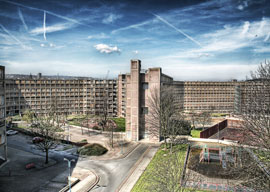
November 24, 2013

Park Hill Estate, Sheffield, England
When I returned home from having examined her, my wife told me that she had received a telephone call from her bank. The person from the bank had asked for her by name and then said, “First I have to ask you some security questions.”
“Since you phoned me,” said my wife, “are you sure it is not I who should be asking you some security questions?”
She then asked the caller for the name of her first pet, her favorite place, the fourth digit of her security code, and her mother’s maiden name, these being the security questions that one is habitually asked when one calls the bank and is lucky (or patient) enough to get through. The bank employee did not get the joke, let alone the point. They get no training in humor.
My wife’s little story set me thinking: What security questions could a bank ask someone like the murderess I had just seen? Clearly not her mother’s maiden name, since marriage was completely unknown in her social (or antisocial) milieu. How about “Your last stepfather but two?” Or “The name of the man whom you currently call father?” Or “The crime for which your third half-brother was first imprisoned?” Or “The name of the first sexual abuser of your second daughter?”
These questions would at least reflect the reality of the terrible world in which the woman lived. This is a world which is quite extensive in England, where it is normal for a woman’s grandchildren to be older than her children, where uncles and aunts are often younger than their nieces and nephews, where practically all siblings are half-siblings and have different surnames, where when you try to understand the family relationships of the children it makes you dizzy, and where there are no husbands and wives, only baby-mothers and baby-fathers.
There is no new thing under the sun, and no doubt there are historical precedents for all this. Yet the sheer extent of this world in England is new, if by “new” we mean something that has happened in the last half-century at the most. It has been created with the blessing of intellectuals who saw the destruction of conventions as a blow against hypocrisy and with the encouragement of politicians who saw in social breakdown an opportunity to remain permanently important.
Long live conventions, say I, and long live the hypocrisy that they engender and upon which their survival depends!